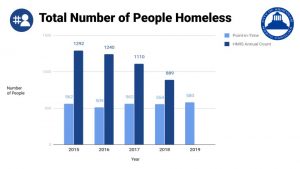Nora Donovan
News Writer
[email protected]

Asheville’s homeless population has remained steady within the past five years
The city of Asheville will be taking it to the streets with their new homeless focused initiative.
At a Sept. 24 City Council meeting, Asheville announced a partnership with Homeward Bound, a local non-profit, to provide assertive street outreach for homeless populations not currently being served, said Polly McDaniel, communications specialist for the city.
This new initiative will allocate $150,000 in their 2019-20 budget to Homeward Bound. Part of the sum will be used to provide street outreach services, as well as fund a full-time staff member at $50,000 per year for three years to help provide more resources.
“Asheville City Council decided this was something that they wanted to fund as part of the budgetary allocations for this fiscal year,” said Brian Huskey, community development analyst and Homelessness Lead for Asheville. “We decided to go with Homeward Bound because they do other street outreach work that’s funded by a particular federal funding stream, the Substance Abuse and Mental Health Services Administration.”
This federal funding stream has been referred to as the Project to Assist in the Transition from Homelessness, or PATH for short.
“The PATH funding is really restricted to a narrow group of behavioral health diagnoses that they can work with and so it is a little bit limited,” Huskey said.
According to the SAMSHA website, the PATH program’s resources are only allocated for those with serious mental illness experiencing homelessness. With the new Asheville initiative, Homeward Bound will be able to help more homeless people who do not meet the usual, limited criteria.
“It’s great that we have funding,” said Nicole Brown, program director of Homeward Bound. “But they can only work with four diagnoses, basically they have to have psychotic episodes in order to qualify for PATH.”
In Asheville, there are very few homeless people that actually qualify under that.
“We definitely do have homeless that do have auditory hallucinations but were talking about the most severe mentally ill people in our community. There are a lot of folks that are homeless that don’t fit into that and so that outreach doesn’t meet the needs of our community,” Brown said.
Huskey credits the non-profit as one of their best partners on homelessness in the city.
Homeward Bound has been around since the 1980’s. They were formerly known as the Hospitality House, focusing primarily on providing shelter. In 2006, they changed their focus to ending homelessness through providing housing and changed their name to Homeward Bound. They now operate numerous programs and homeless services such as the AHOPE Day Center, a PATH outreach program and Room in the Inn. Thanks to the initiative, they will be adding a new outreach program.
“They line up with the city’s philosophy on ending homelessness, the housing first approach,” McDaniel said.
Housing first has been known as an evidence based approach to solving the homeless problem that prioritizes permanent housing placement.
“You get someone in housing and then they get a stable place to begin to address other issues that may be at play for them, rather than make somebody jump through burning hoops of fire before they can get into housing,” Huskey said.
Outdated housing readiness strategies tend to make the client get sober, get on medication or finish their education before assisting in finding a home.
“You get them into housing first and then you can begin to put all the other pieces of the puzzle in place,” Huskey said. “There’s 20 plus years of research behind housing first and that is the way we have decided to work.”
According to data provided by the city of Asheville, the number of homeless has remained steady over the past four years. In 2015, there were an estimated 562 people, in 2016, 509, in 2017 there were 562 and in 2018 there were 554. This year there were an estimated 580, which is a 4.7 percent increase.
“I have every confidence in Homeward Bound and their team over there, they are a really capable group of folks, they have had great success at everything that they have set their minds to doing,” Huskey said.
While confidence can be important, the city of Asheville relies on concrete evidence to support their new initiative.
“Yes, we will be successful, because we get scored on this, and scoring relates to funding,” Huskey said.
Asheville gets graded on system performance measures by the U.S. Department of Housing and Urban Development as well as the U.S. Interagency Council on Homelessness. The aim of these measures are to make sure homelessness in Asheville remains rare, brief and non-recurring.
However, the city can’t solve the problem alone. Homeward Bound’s AHOPE Day Center, a low barrier establishment where homeless can safely leave their belongings, shower, or use the phone heavily relies on volunteers.
“We always need socks, towels and coffee,” said Pip, program manager of AHOPE.

















